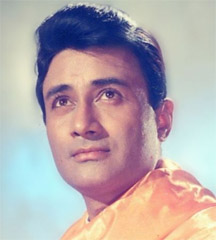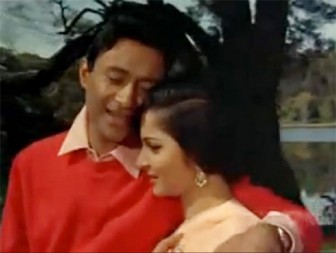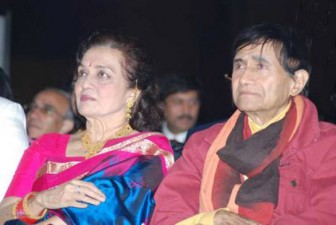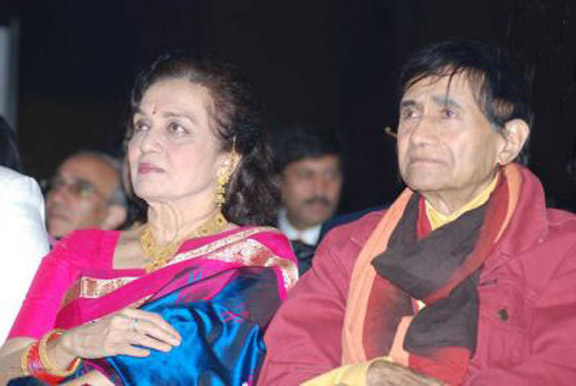Movie actor and director Dev Anand, known for his joie de vivre as Bollywood’s “evergreen hero”, has died aged 88, Reuters reported yesterday bringing, it said, the end to an era of Indian cinema.

Anand, whose last film, “Chargesheet”, was released in September, was in London with his son, Suneil, when he died on Saturday from a heart attack, aide Mohan Churiwala told Reuters.
“He was never sick. Even when I spoke to him last evening, he sounded fine — hale and hearty,” Churiwala told Reuters.
Anand is also survived by his wife, Kalpana Karthik.
Born in Lahore, Anand journeyed to Mumbai to work as a clerk in a government office in 1944 and got his first break two years later in the film “Hum Ek Hain”, Reuters said. He turned director soon afterwards and went on to deliver a string of hits.

“CID”, “Guide”, “Hare Rama Hare Krishna” and “Jewel Thief” are movies considered part of Bollywood’s essential viewing catalogue, and Anand’s unique acting style is widely celebrated, Reuters said.
According to Reuters, he is said to have been inspired by Hollywood’s Gregory Peck, but his own casual style and the signature nod of his head while delivering lines were often imitated by fans.

Anand refused to retire from Bollywood, often telling interviewers he would work till his last breath. He was working on a new film at the time of his death, Reuters said.
“An era has come to an end,” Bollywood superstar Amitabh Bachchan wrote on Twitter. “Dev Anand leaves a void never perhaps to be filled again… his never-give-up belief, his joy of life.”
In its tribute, the Times of India said he could make even the claustrophobic interiors of Qutub Minar seem the most romantic place in the world. Few women wouldn’t have secretly fantasized of swapping places with heroine Nutan in that song, Dil ka bhanwar kare pukar (‘Tere Ghar Ke Saamne’, 1963). Anand was seen as part of the famed trinity – along with Dilip Kumar and the late Raj Kapoor – who ruled Hindi films in the 1950s and 60s.
The Times said he was much more than oodles of easy charm. “He had an insatiable lust for life. What do you say of a film career spanning 65 years, of someone who played the leading man for over 40 years, whose production house, Navketan, (co-founded with brother Chetan) represents the best of mainstream Hindi cinema (‘Taxi Driver’, ‘Kalapani’, ‘Hum Dono’, ‘Guide’), and who after releasing his latest film ‘Chargesheet’ in September this year was already planning his next venture: a sequel to ‘Hare Rama Hare Krishna’.
“His energy and drive was almost superhuman. Like a true artiste, Dev Anand never retired; he just breathed his last dreaming about his next film. Dev Anand wasn’t just a star; he created stars too. Without him, Zeenat Aman’s career wouldn’t have taken off.
“In bikini-friendly Aman, he fashioned a new, westernised Hindi film heroine, the first of her kind. He also gave breaks to Tina Munim, Richa Sharma, Jackie Shroff, Tabu and a host of other newcomers. In most movies, the actor played himself. But in ‘Hum Dono’ and ‘Guide’ (also made in English), he earned accolades for his acting. Like Raj Kapoor, he created a fabulous ensemble at his production house Navketan.”
The Times noted that like the Kapoors, the Anands too were a famous trio of brothers; Chetan and Vijay being the other two. Director Raj Khosla, music director S D Burman, lyricist Sahir Ludhianvi and many such stalwarts were regulars with Navketan.
“The Gurdaspur-born actor graduated in English literature in Lahore. He worked as a military-office clerk at Churchgate before debuting in PL Santoshi’s ‘Hum Ek Hain’ (1946) but ‘Ziddi’ (1948) was his first success. However, ‘Baazi’ (1951), directed by Guru Dutt on account of an old promise made to the actor, rocketed him to stardom. Over the next two decades, Dev Anand delivered more flops than hits.
Yet, his star stature remained undiminished. Some of his biggest hits were ‘Taxi Driver’ (1954), ‘CID’ (1956), ‘Paying Guest‘ (1957), ‘Kalapani’ (1958), ‘Jab Pyaar Kisi Se Hota’ (1961), ‘Tere Ghar ke Samne’ (1963), ‘Johny Mera Naam’ (1970), ‘Hare Rama Hare Krishna’ (1971) and ‘Des Pardes’ (1975). His last box-office success was the action thriller, ‘Lashkar’ (1989)”, the Times said.
In the 1970s, he stopped playing the romantic lover and switched to doing more action-oriented films. He also largely started concentrating on directing films.
His movies were often ahead of their times. ‘Prem Pujari’ was anti-war in content, ‘Hare Rama Hare Krishna’ captured the hippie movement and ‘Des Pardes’ spoke about the life of immigrants.
An aide of Anand said the last rites will be performed in London tomorrow or Wednesday.
It is, however, likely that the government of India via its high commission in London will offer to take his body back to Mumbai.
In a famous interview with CNN in the mid-1990s, he was asked what he thought about being compared to the Hollywood star Peck.
He replied, “Gregory Peck was Gregory Peck. At this stage I would rather be Dev Anand.”
“He was always enthusiastic and eager to do the next film,” actress Hema Malini, who did films such as Johny Mera Naam with Anand told the Hindustan Times. “Whenever I spoke to him he always told me to continue acting. May be that’s why I keep working.”
Filmmakers spoke of Anand’s influence on their directing styles and philosophy. “He broke away from the traditional and made certain kinds of films with a certain kind of style, which later became templates (for others),” said director Sudhir Mishra who said Chitrangada Chowdhary’s character in his Hazaraon Khwaishen Eisi had influences of the iconic Rosy played by Waheeda Rehman in Guide.
While cinema remained the “only thing he knew”, his friends in the industry spoke of his humility. “He was a perfect gentleman,” Bhatia, told the Hindustan Times. “He always answered his phone and used to say if people want to talk to me why should there be a secretary.”
In an interview to PTI last year, Anand said, “I am always in a rush because time is slipping away and I am chasing it, chasing it. I have so many stories to tell but where is the time.”

